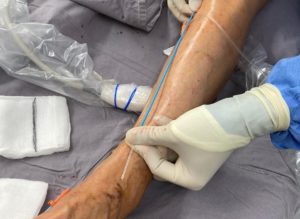Varicose veins can bleed due to a variety of reasons. The underlying cause of varicose veins is a condition called venous insufficiency, where the valves in the veins are weakened or damaged, leading to blood pooling and increased pressure in the veins. When the pressure becomes too high, it can cause the veins to rupture and bleed. Additionally, the skin over varicose veins can become thin and fragile, making it more prone to injury and bleeding.
Why does the skin over varicose veins become thin and fragile?
The skin over varicose veins can become thin and fragile due to a combination of factors related to venous insufficiency. When the valves in the veins are weakened or damaged, it leads to blood pooling in the veins, increasing pressure within them. This elevated pressure can cause inflammation and damage to the surrounding tissues, including the skin. Over time, the constant pressure can impair the skin’s ability to regenerate and repair itself, leading to thinning and fragility.
Moreover, the impaired blood flow and oxygen supply caused by venous insufficiency can also affect the health of the skin. Reduced nutrients and oxygen to the skin can result in decreased collagen production, which is important for maintaining the strength and elasticity of the skin. As a result, the skin over varicose veins may become thin, delicate, and more susceptible to injuries, such as cuts or scrapes, which can lead to bleeding.
What are the potential complications of bleeding from varicose veins?
Bleeding from varicose veins can lead to several potential complications including:
- Hemorrhage: In some cases, the bleeding from varicose veins can be severe and result in significant blood loss. This can lead to a medical emergency that requires immediate attention.
- Anemia: Prolonged or frequent bleeding from varicose veins can cause anaemia, a condition characterized by a deficiency of red blood cells. Anaemia can lead to fatigue, weakness, and other symptoms.
- Infection: When varicose veins bleed, there is a risk of infection if bacteria enter the wound. This can result in cellulitis, an infection of the skin and underlying tissues. In severe cases, it can lead to a more serious infection called sepsis.
- Ulceration: Chronic bleeding from varicose veins can cause skin changes and ulcers. These ulcers are slow-healing and can be painful. They often occur near the ankles and can significantly affect the quality of life.
- Recurrence of bleeding: If the underlying cause of varicose veins is not addressed, there is a risk of recurrent bleeding episodes. It is essential to seek medical evaluation and treatment to prevent further bleeding.

Dr Tang is about to ablate the faulty truncal varicose vein with venaseal glue. Responsible for the high-pressure build-up at the ankle leading to recurrent bleeding from the varicose vein on top of the foot.
What to do if your varicose veins begin to bleed:
If your varicose veins start to bleed, it’s important to take immediate action to stop the bleeding and prevent any complications. Here are the steps you can take:
- Apply direct pressure: Use a clean cloth or sterile gauze to apply firm pressure directly on the bleeding vein. Maintain the pressure for at least 10 minutes to help stop the bleeding.
- Elevate the leg: Raise the leg with the bleeding varicose vein above the level of your heart. This can help reduce blood flow to the area and minimize bleeding.
- Apply a compression bandage: After the bleeding has stopped, wrap the affected leg with a compression bandage to provide support and reduce swelling. Make sure the bandage is not too tight to restrict blood flow.
- Seek medical attention: Even if you have successfully stopped the bleeding, it is important to consult a healthcare professional. They can assess the severity of the situation and provide appropriate treatment or further guidance.
Remember, if the bleeding is severe or does not stop with direct pressure, seek immediate medical attention or call emergency services.
It is important to consult with a vascular surgeon if you experience bleeding from varicose veins to assess the severity of the situation and determine the appropriate treatment options.









